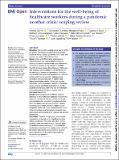Interventions for the well-being of healthcare workers during a pandemic or other crisis : scoping review
Abstract
Objectives The aim of this scoping review was to identify pre-existing interventions to support the well-being of healthcare workers during a pandemic or other crisis and to assess the quality of these interventions. Design Arksey and O’Malley’s five-stage scoping review framework was used to identify the types of evidence available in the field of well-being interventions for healthcare workers during a pandemic. PubMed, PsycINFO, Embase, Scopus, Web of Science, CINAHL and ERIC databases were searched to find interventions for the well-being of doctors during pandemics. Owing to a lack of results, this search was expanded to all healthcare workers and to include any crisis. Databases were searched in June 2020 and again in October 2020. Inclusion/exclusion criteria Articles were included that studied healthcare workers, reported an intervention design and were specifically designed for use during a pandemic or other crisis. Well-being was defined broadly and could include psychological, physical, social or educational interventions. Results Searching produced 10 529 total academic references of which 2062 were duplicates. This left 8467 references. Of these, 16 met our inclusion criteria and were included in data extraction. During data extraction, three more papers were excluded. This left 13 papers to summarise and report. Of these 13 papers, 6 were prospective studies and 7 were purely descriptive. None of the interventions were theoretically informed in their development and the quality of the evidence was generally deemed poor. Conclusions There are no high-quality, theory-based interventions for the well-being of healthcare workers during a pandemic or other crisis. Given that previous pandemics have been shown to have a negative effect on healthcare workers well-being, it is imperative this shortcoming is addressed. This scoping review highlights the need for high-quality, theory-based and evidence-based interventions for the well-being of healthcare workers during a pandemic.
Citation
Cairns , P , Aitken , G , Pope , L M , Cecil , J E , Cunningham , K B , Ferguson , J , Gibson-Smith , K , Gordon , L , Johnston , P , Laidlaw , A , Scanlan , G M , Tooman , T R , Wakeling , J & Walker , K 2021 , ' Interventions for the well-being of healthcare workers during a pandemic or other crisis : scoping review ' , BMJ Open , vol. 11 , no. 8 , e047498 . https://doi.org/10.1136/bmjopen-2020-047498
Publication
BMJ Open
Status
Peer reviewed
ISSN
2044-6055Type
Journal item
Description
This study was supported by Chief Scientist Office of Scotland, grant number COV/ABN/20/06.Collections
Items in the St Andrews Research Repository are protected by copyright, with all rights reserved, unless otherwise indicated.

